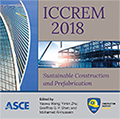International Conference on Construction and Real Estate Management 2018
Lean Construction Management in the Construction of the Whole Life Cycle of Use
Publication: ICCREM 2018: Sustainable Construction and Prefabrication
ABSTRACT
With the development of economic globalization and increasingly fierce competition in the real estate market, the scale, technology, and functions of construction projects all have more stringent requirements. These all put forward higher requirements on the management flexibility of construction projects in real estate enterprises. Under such objective conditions, the application of lean construction system can effectively improve the efficiency of construction. Based on lean construction theory and real estate management status quo, a new management model with strong adaptability and high standardization is put forward, and the management of real estate enterprises in the construction of the whole life cycle of the project is clarified so as to realize the management efficiency of real estate enterprises improve.
Get full access to this article
View all available purchase options and get full access to this chapter.
ACKNOWLEDGE
Kindly thanks are due to A/Prof Wei Wang for assistance with the analysis. And we sincerely appreciate the support and cultivation of Harbin Institute of Technology.
REFERENCE
Grasso, L.P. (2005). “Are ABC and RCA accounting systems compatible with lean management.” Management Accounting Quarterly, (2005), 7.
Howell, G.A. and Koskela, L.J. (2000). “Reforming project management: the role of lean construction.” Proc Conference of the International Group for Lean Construction, Brighton, UK, 17–19.
Koskela, L. (1992). “Application of the new production philosophy to construction.” Physics Letters B, 40(2), 181–184.
Krijnen, A. (2014). “The Toyota way: 14 management principles from the world’s greatest manufacturer.” Action Learning Research and Practice, 4(1), 109–111.
Nakagawa, Y. (2005). “Importance of standard operating procedure documents and visualization to implement lean construction.” 13th International Group for Lean Construction Conference, Sydney, Australia, 207–215.
Tommelein, I.D. (1998). “Pull-driven scheduling for Pipe-Spool installation: simulation of lean construction technique.” Journal of Construction Engineering and Management, 124(4), 279–288.
Xiong, W. (2009). Lean thinking in the construction industry. Tianjin University of Science and Technology, Tianjin, China, 52–63. (in Chinese).
Zhao, P. (2008). Research on the planning system of lean construction. Nanjing University of Technology, Nanjing, China, 23–47. (in Chinese).
Information & Authors
Information
Published In
ICCREM 2018: Sustainable Construction and Prefabrication
Pages: 172 - 182
Editors: Yaowu Wang, Professor, Harbin Institute of Technology, Yimin Zhu, Professor, Louisiana State University, Geoffrey Q. P. Shen, Professor, Hong Kong Polytechnic University, and Mohamed Al-Hussein, Professor, University of Alberta
ISBN (Online): 978-0-7844-8173-8
Copyright
© 2018 American Society of Civil Engineers.
History
Published online: Aug 8, 2018
Authors
Metrics & Citations
Metrics
Citations
Download citation
If you have the appropriate software installed, you can download article citation data to the citation manager of your choice. Simply select your manager software from the list below and click Download.
